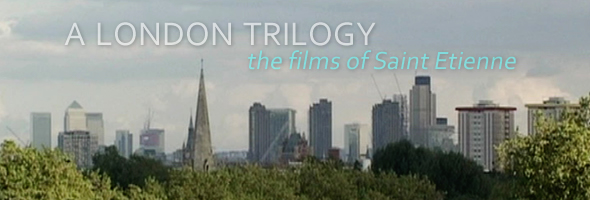
Color, 2003-2007, 180m.
Directed by Paul Kelly
BFI (DVD) (UK R0 PAL) / WS (1.78:1) (16:9) / DD2.0

Color, 2003-2007, 180m.
Directed by Paul Kelly
BFI (DVD) (UK R0 PAL) / WS (1.78:1) (16:9) / DD2.0
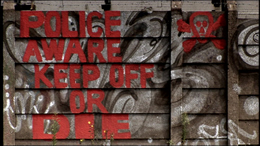 In 2003, the superb British pop group Saint Etienne --
In 2003, the superb British pop group Saint Etienne -- 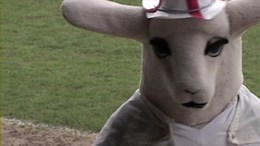 consisting of Bob Stanley, Pete Wiggs, and vocalist Sarah Cracknell -- enlisted filmmakers Paul Kelly and Kieran Evans to direct a non-narrative documentary to tie in with their latest album, Finisterre. The film of the same name was excerpted as background projections during their concert tour, with deadpan (and sometimes hilariously obscure) male narration tying together both the album and film. The concept here is simply a snapshot of London, in areas both scenic and neglected, with the band's music (mostly instrumental but with a handful of vocal numbers like "Shower Scene" and the title song) providing accompaniment.
consisting of Bob Stanley, Pete Wiggs, and vocalist Sarah Cracknell -- enlisted filmmakers Paul Kelly and Kieran Evans to direct a non-narrative documentary to tie in with their latest album, Finisterre. The film of the same name was excerpted as background projections during their concert tour, with deadpan (and sometimes hilariously obscure) male narration tying together both the album and film. The concept here is simply a snapshot of London, in areas both scenic and neglected, with the band's music (mostly instrumental but with a handful of vocal numbers like "Shower Scene" and the title song) providing accompaniment.
Finisterre wasn't quite the group's first foray into movies, as they had also written and recorded a full soundtrack for the quickly forgotten indie comedy The Misadventures of Margaret. In a practice all too common at the time (also seen in more extreme form with Belle and Sebastian's work on Todd Solondz's Storytelling), most of their work was either thrown out or severely altered in the finished film, so it's easy to see why they would want more control and involvement in their film projects moving forward. Though it isn't explicitly stated, music is a recurring theme in the film (openly inspired by the 1969 TV favorite The London Nobody Knows and Patrick Keiller's 1994 filmic essay London) with visuals and narration mentioning the impact of past artists (including The Beatles, naturally) along with audio comments from members of Earl Brutus (Mark Perry, Vic Godard and Nick Sanderson) among many others. It's both dreamy and melancholy, capturing a frozen moment in time but also feeling like part of a continual evolution of a city whose complexity and allure never seem to dim.
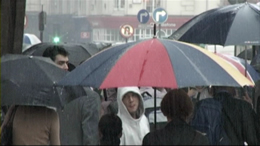 After this first full-length directorial effort (which clocked in at 57 minutes in its final form), Kelly, who had been directing the band's videos since the single "Avenue" off their second album, returned to the documentary format several more times, with the band providing both preexisting songs and original scores for a variety
After this first full-length directorial effort (which clocked in at 57 minutes in its final form), Kelly, who had been directing the band's videos since the single "Avenue" off their second album, returned to the documentary format several more times, with the band providing both preexisting songs and original scores for a variety 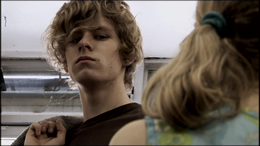 of projects. The BFI DVD covers this diverse ground under the title of A London Trilogy, which refers to the three longest films but camouflages the fact that there are far more short films tucked in as well. The second part of the "trilogy" is What Have You Done Today Mervyn Day?, shot in 2005 as London was in contention to host the 2012 Olympics. As we all know now, they wound up getting it, and the film became a chronicle of the city's transformation as seen through the eyes of a young paperboy (the title character, played by the director's nephew, Noah Kelly) in the city's Lower Lea Valley, a declining region suddenly the object of major redevelopment for the newest Olympic Park.
of projects. The BFI DVD covers this diverse ground under the title of A London Trilogy, which refers to the three longest films but camouflages the fact that there are far more short films tucked in as well. The second part of the "trilogy" is What Have You Done Today Mervyn Day?, shot in 2005 as London was in contention to host the 2012 Olympics. As we all know now, they wound up getting it, and the film became a chronicle of the city's transformation as seen through the eyes of a young paperboy (the title character, played by the director's nephew, Noah Kelly) in the city's Lower Lea Valley, a declining region suddenly the object of major redevelopment for the newest Olympic Park.
The reactions of the public were mixed (understandably so, as anyone living in a city before and after the Olympics process can easily relate to), and this tension dominates the entire film as we hear his mother and grandfather (voiced by Linda Robson and pop star David Essex) reflecting the two generations before him when industries like plastic production first put it on the map. Essential to appreciating this, however, is another much shorter film included here, "Seven Summers," which revisits the same spot seven years later as the Olympics are about to commence. 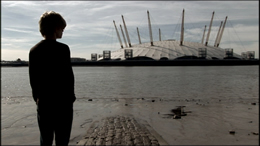 The unique atmosphere of the area has been completed blotted out by this point, leaving a bittersweet memorial of sorts instead of a makeshift neighborhood and oddball landscape compiled from the remnants of past industries. It's especially gratifying to have this one finally out in a regular commercial edition, as it's been maddeningly difficult to see otherwise; it was only issued as a limited DVD/CD combo from Heavenly Films (a branch of the band's Heavenly Records) and deserves a much bigger audience.
The unique atmosphere of the area has been completed blotted out by this point, leaving a bittersweet memorial of sorts instead of a makeshift neighborhood and oddball landscape compiled from the remnants of past industries. It's especially gratifying to have this one finally out in a regular commercial edition, as it's been maddeningly difficult to see otherwise; it was only issued as a limited DVD/CD combo from Heavenly Films (a branch of the band's Heavenly Records) and deserves a much bigger audience.
Two years later in 2007, Kelly, Saint Etienne, and regular producer Andrew Hinton were selected as the South Bank Centre's artists-in-residence 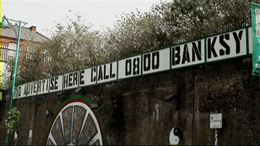 to coincide with the renovation of its Royal Festival Hall, a locale which forms the basis of the third part of the trilogy, This Is Tomorrow (which shares its name with one of the band's songs). The various designers involved with the building over the years are interviewed while the process of restoring it to glory is covered in great detail, accompanied by a swirling electronic soundtrack. The focal point holding this together is an event over five decades past, 1951's Festival of Britain, which inaugurated the Hall as modern cultural development. There's a fair amount of archival footage included as well, making it both a pitch piece for the Hall and a thumbnail history lesson. It's easily the most optimistic of the three main pieces and would make a fine way to round out viewing the entire disc if you're doing it all in one sitting.
to coincide with the renovation of its Royal Festival Hall, a locale which forms the basis of the third part of the trilogy, This Is Tomorrow (which shares its name with one of the band's songs). The various designers involved with the building over the years are interviewed while the process of restoring it to glory is covered in great detail, accompanied by a swirling electronic soundtrack. The focal point holding this together is an event over five decades past, 1951's Festival of Britain, which inaugurated the Hall as modern cultural development. There's a fair amount of archival footage included as well, making it both a pitch piece for the Hall and a thumbnail history lesson. It's easily the most optimistic of the three main pieces and would make a fine way to round out viewing the entire disc if you're doing it all in one sitting.
In addition to "Seven Summers," there are other pertinent shorts as well including the wonderfully odd "Monty the Lamb," a brief 2006 portrait of a day in the life of the titular mascot for North London's Hendon Football Club. You get to see the various permutations of lamb mania along with some colorful football fans sporting a gaudy array of team apparel, with the band's songs like "Are We Gonna Be Alright" and "Soft Like Me" providing upbeat support. You can also see some outtakes from Finisterre in the quick "Banksy in London," an overview of work by the famous (and mysterious) graffiti artist, much of it long since eradicated. Amusingly, much of his work blends almost seamlessly with the barrage of commercial messages covering the city, providing a witty commentary on the constant variety of text being consumed by people on a daily basis. The 2008 offering "The Other South Bank" is another mood piece, albeit one with the heaviest political slant of them all, depicting the title region on the river Tees where massive layoffs under Margaret Thatcher turned a once-thriving community into a ravaged but still spirited neighborhood. Segregated to a separate area of the menu are three very brief additional extras under the banner of "Today's Special," each offering a 2004 snapshot of London cafes and coffee shops teetering on the brink of extinction. Respectively titled "Tea Rooms," "Eldon Street," and "New Piccadilly," they are all gone now but linger on here like ghosts. Adding some further context is the dense liner notes booklet containing essays by Kelly, Stanley, Sukhdev Sandhu, Owen Hatherley, and Tom Dyckhoff, with a host of historical detail adding to the appreciation of a very worthwhile set. Video quality ranges depending on the source, with Finisterre and the 2003 and 2006 shorts filmed in 16:9 standard definition and everything else lensed in HD; you'll see some of the usual limitations with both formats in view here but it's all part of their charm and texture, an endearing release truly unlike any other.
![]()